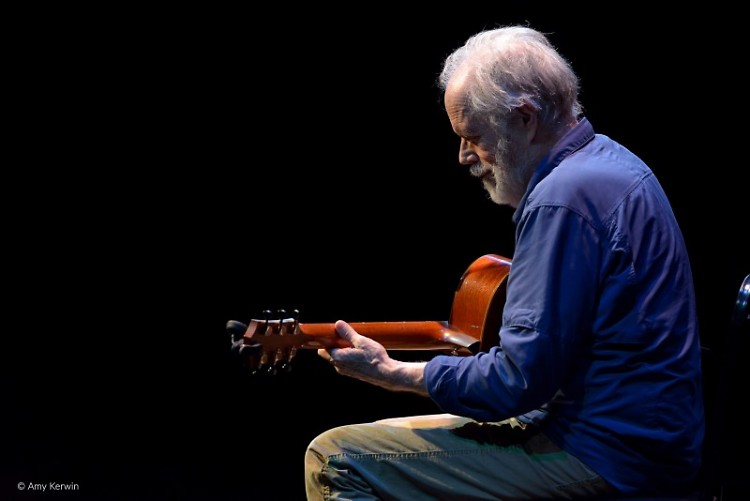Tickets:
Tickets for Leo Kottke ($55/$40/$25 - plus $3 per ticket fee) are available at scmcgr.org or by calling 616-459-2224. St. Cecilia Music Center is located at 24 Ransom Ave NE, Grand Rapids, MI 49503. The concert will begin at 7:30 p.m.
This dispatch was added by one of our Nonprofit Neighbors. It does not represent the editorial voice of The Rapidian or Community Media Center.

Leo Kottke /Amy Kerwin
Tickets for Leo Kottke ($55/$40/$25 - plus $3 per ticket fee) are available at scmcgr.org or by calling 616-459-2224. St. Cecilia Music Center is located at 24 Ransom Ave NE, Grand Rapids, MI 49503. The concert will begin at 7:30 p.m.
St. Cecilia Music Center (SCMC) is proud to bring back legendary 6- and 12-string guitarist Leo Kottke on Tuesday, May 16 at 7:30 p.m. Leo Kottke’s amazing guitar playing, and whimsical humor will delight the audience. He is known for a fingerpicking style that draws on blues, jazz, and folk music, and for syncopated, polyphonic melodies. In concert, Kottke intersperses humorous and often bizarre monologues with vocal and instrumental selections from throughout his career, played solo on six and twelve string guitars.
Executive & Artistic Director of SCMC Cathy Holbrook says, “Concerts featuring Leo Kottke fill the Royce Auditorium with awesome reverence for his guitar playing and laughter at his funny monologues about his life experiences. We are so excited to have Leo back at St. Cecilia Music Center for our final concert of this season!”
Tickets for Leo Kottke ($55/$40/$25 - plus $3 per ticket fee) are available at scmcgr.org or by calling 616-459-2224. St. Cecilia Music Center is located at 24 Ransom Ave NE, Grand Rapids, MI 49503. The concert will begin at 7:30 p.m.
Leo Kottke’s Bio
Acoustic guitarist Leo Kottke was born in Athens, Georgia, but left town after a year and a half. Raised in 12 different states, he has absorbed a variety of musical influences as a child, flirting with both violin and trombone, before abandoning Stravinsky for the guitar at age 11.
After adding a love for the country-blues of Mississippi John Hurt to the music of John Phillip Sousa and Preston Epps, Kottke joined the Navy underage, to be underwater, and eventually lost some of his hearing shooting at lightbulbs in the Atlantic while serving on the USS Halfbeak, a diesel submarine.
Kottke had previously entered college at the University of Missouri, dropping out after a year to hitchhike across the country to South Carolina, then to New London and into the Navy, with his twelve string. “The trip was not something I enjoyed,” he has said, “I was broke and met too many interesting people.”
Discharged in 1964, he settled in the Twin Cities area and became a fixture at Minneapolis’ Scholar Coffeehouse, which had been home to Bob Dylan and John Koerner. He issued his 1968 recording debut LP Twelve String Blues, recorded on a Viking quarter-inch tape recorder, for the Scholar’s tiny Oblivion label. (The label released one other LP by The Langston Hughes Memorial Eclectic Jazz Band.)
After sending tapes to guitarist John Fahey, Kottke was signed to Fahey’s Takoma label, releasing what has come to be called the Armadillo record. Fahey and his manager Denny Bruce soon secured a production deal for Kottke with Capitol Records.
Kottke’s 1971 major-label debut, “Mudlark” positioned him somewhat uneasily in the singer/songwriter vein, despite his own wishes to remain an instrumental performer. Still, despite arguments with label heads as well as with Bruce, Kottke flourished during his tenure on Capitol, as records like 1972’s “Greenhouse” and 1973’s live “My Feet Are Smiling” and “Ice Water” found him branching out with guest musicians and honing his guitar technique.
With 1975’s Chewing Pine, Kottke reached the U.S. Top 30 for the second time; he also gained an international following thanks to his continuing tours in Europe and Australia.
His collaboration with Phish bassist Mike Gordon, “Clone,” caught audiences’ attention in 2002. Kottke and Gordon followed with a recording in the Bahamas called “Sixty Six Steps,” produced by Leo’s old friend and Prince producer David Z.
Kottke has been awarded two Grammy nominations; a Doctorate in Music Performance by the Peck School at the University of Wisconsin, Milwaukee; and a Certificate of Significant Achievement in Not Playing the Trombone from the University of Texas at Brownsville with Texas Southmost College.
St. Cecilia Music Center’s mission is to promote the study, appreciation and
performance of music to enrich the lives of West Michigan residents.
The Center fulfills this mission by
presenting visiting world-class artists in concert,
providing music education for all ages through our School of Music and
preserving a historic building for musical activities and community events
###
The Rapidian, a program of the 501(c)3 nonprofit Community Media Center, relies on the community’s support to help cover the cost of training reporters and publishing content.
We need your help.
If each of our readers and content creators who values this community platform help support its creation and maintenance, The Rapidian can continue to educate and facilitate a conversation around issues for years to come.
Please support The Rapidian and make a contribution today.